- 01793 845234
- info@mkvphysio.co.uk
- 79 High Street, Wroughton, Swindon, Wilts. SN4 9JU [see map]
We aim to give you an expert assessment of your presenting complaint and then to devise a treatment plan that suits you and your lifestyle, whether it's a recent injury or ongoing complaint.
We use predominantly a manual therapy approach and give advice on how you can help yourself achieving results that last.
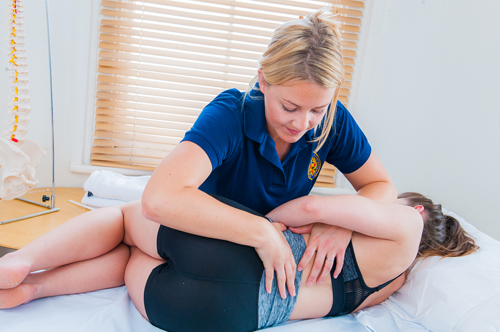
These are passive manoeuvres which can be performed on any joint in the body. They should be painless but may cause some discomfort. They are expected to produce an immediate change in how the joint moves and therefore gives an immediate benefit to the patient either in range of movement or a reduction in pain.
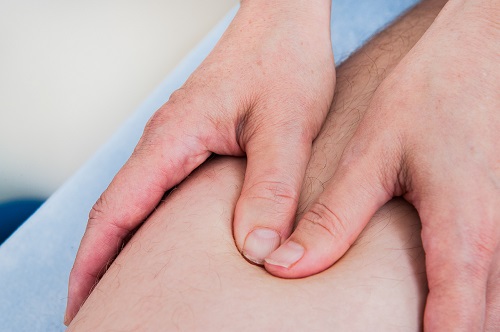
There are many types of massage each having a different effect on the tissues. The type of massage selected depends on the desired effect such as relaxation, softening, release of scar tissue etc.
Myofascial release techniques particularly address fascia which has a profound effect on muscles, nerves, joints, viscera etc throughout the whole body. Myofascial systems hold a very important role in achieving proper balance within the body. Old injuries, repetitive movements, abnormal posture etc all lead to adaptive patterns within the fascial system which then gives rise to further symptoms. Myofascial release techniques are used in conjunction with joint manipulation and muscle re-education to achieve faster and longer term benefit.
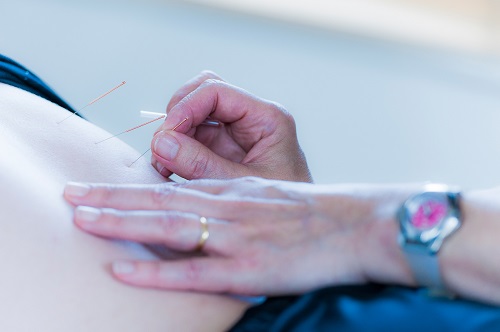
Acupuncture is commonly used in physiotherapy to treat a range of pain problems. It can reduce pain and muscle spasm by acting on the body's nervous system to release a range of chemicals, for example, endorphins and serotonin. Acupuncture is commonly used in combination with other treatment approaches like exercise and manual therapy.
We are members of the Acupuncture Association of Chartered Physiotherapists (AACP) which means we adhere to their strict hygiene guidelines, safety procedures attend the training courses and educational updates required to stay on the membership register.
Further information about acupuncture and how it can help relieve pain please call us on 01793 845234 or email info@mkvphysio.co.uk
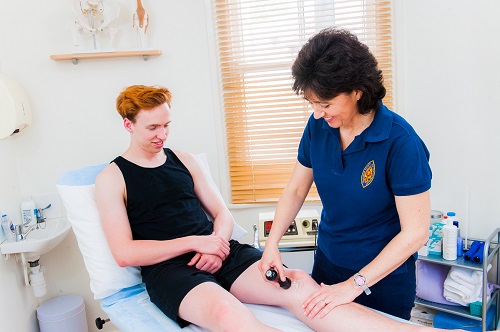
Electrotherapy can have many uses in physiotherapy.
There is now evidence that modalities such as ultrasound can have a positive effect on tissue repair and healing, assisting the body's own natural healing process.
Other electrotherapy such as a TENS machine or 'stimplus' are used for pain relief. They can give relief of pain by stimulating the sensory nerves which then 'block' the pain messages from reaching the brain.
They also stimulate release of the body's own pain killers (opioids). Patients can be given instruction and loaned these pieces of equipment for a trial of home use. Electrotherapy is often used in conjunction with other techniques.
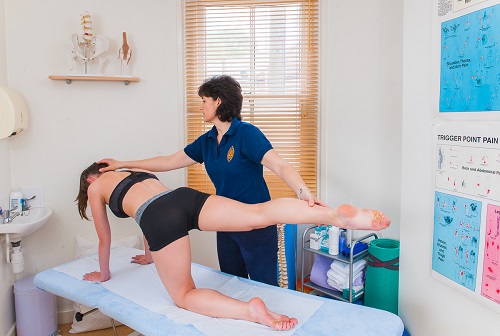
Advice on specific exercises to address specific problems is widely used in physiotherapy. Not many of our patients 'escape' without being given any exercises!
Often the exercises are a treatment in themselves or they can be used to maintain the improvement gained within physiotherapy sessions.
Exercises can be used to restore normal function, strengthen muscles that have become weak and under used, switch off other muscles that have become over active and tight, stretch out tight soft tissues and re-educate posture.p>
They are most effective when they are specific to the problem that is being addressed, taught and performed accurately and then progressed as the problem resolves.
We use 'Physio Tools', a computer programme, which allows us to print out or email to you written instruction and pictures of your specific exercise.
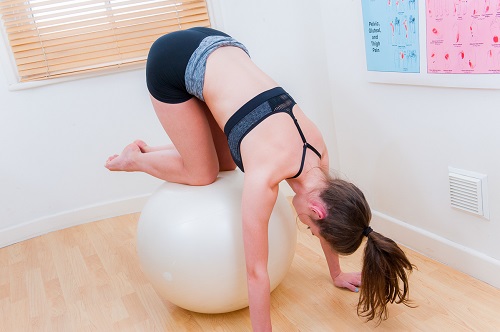
Pilates is a method of exercising that works on strengthening and mobilising the body in a balanced way.
It is particularly helpful in rehabilitation as it works on the deep stabilising muscles (core strength) that are important for posture and joint protection. Exercises can be graded according to the individual's ability and are therefore suitable for all ages and fitness levels.
We teach Pilates on a 1:1 basis, this allows us to target particular areas of the body that are either weak or tight and progress exercises at the individuals own pace ensuring correct technique and maximum benefit.
We often combine Pilates instruction with other treatments for a holistic approach with lasting benefits.
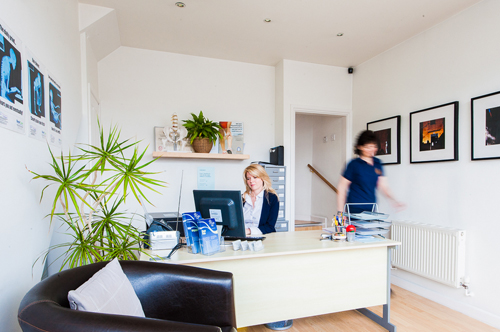
Pain management physiotherapists are concerned with the assessment and management of persistent pain problems. A range of techniques are utilised - physical, psychological and practical - with the aim of reducing pain symptoms, along with the associated disability and distress.
Patients with a wide range of conditions can be helped by this approach, for example, spinal pain, headaches, osteoarthritis, Fibromyalgia, Chronic Regional Pain Syndrome, and many others.
People with severe and/or persistent pain often find that it has significantly impacted on their day to day life, with the following problems being common:
It can be difficult to know what is best to do - "should I push through the pain or rest until it settles?"
Both of these things can make the pain worse and people can get caught up in a cycle of poor fitness and worse pain.
A pain management physiotherapist can teach you how to manage your pain more effectively by; educating you about pain, and why it becomes persistent; helping you to work out the amount of activity and exercise you can do without leading to an increase in pain; devising a personalised exercise programme for you to follow to improve overall fitness and strength; teaching relaxation techniques to manage the effects of stress on the body; and through setting goals and graded exercise help you to return to activities that have been cut down due to pain. Other techniques commonly used include acupuncture and a TENS machine.
The techniques we use have been well researched and are successful in treating long-term pain. They are used in pain management centres all over the world.
This is about developing active coping strategies to manage your pain symptoms, rather than relying on others to do this for you. In the long-term this is a much more effective approach. For some, it is about accepting the pain as part of their lives, but being able to focus and work on the things that they can do, rather than on the things that they can't.
Ultimately, this is about helping people to feel more confident in their ability to manage their pain, resulting in a more enjoyable and fulfilling life, where they are in control of the pain, rather than the pain controlling them.
Time will be spent taking a history of your condition, including previous treatments, and discussing your goals. This may be around wanting to increase your activity levels, getting back to hobbies, or returning to work. Diaries are commonly used to understand more about your current activity levels, and what you are able to do - including those things that can make the pain better, or worse.
Following this, we will work together to formulate your personalised management plan, and support you in putting this into practice. Some people will only need a few sessions to do this, others may benefit from more.
The initial session will last for 45 minutes, and the follow-ups for 30 minutes.
You may find the following links helpful in understanding more about persistent pain and ways to manage it:
Pain Concern - www.painconcern.org.uk
This registered charity offers information and support for those in pain, including a range of free fact sheets and leaflets.
Pain Relief Foundation - www.painrelieffoundation.org.uk
This UK charity funds research into the causes and treatment of chronic pain. They aim to promote the education of patients and health professionals about pain management. The website provides information on a range of pain conditions.
Pain Support - www.painsupport.co.uk
This charity was set up by a patient suffering from back pain. It contains a range of information on managing pain and produces a number of booklets.
The British Pain Society - www.britishpainsociety.org
This is the largest professional organisation in the field of pain in the UK. The website contains information for the general public on chronic pain, pain services, and medication.
The Pain Toolkit - www.paintoolkit.org
This website includes some helpful information booklets and resources that may provide you with some handy tips and skills to support you along the way to managing your pain.
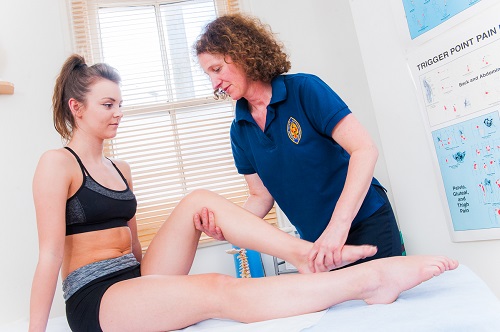
All physiotherapists at MkV are experienced in treating injuries resulting from trauma. The most common injury is a whiplash injury caused by the forces imposed on the spine during a car accident. Most people make a good recovery from this type of injury but it is important to receive good advice and treatment from an early stage. Recovery is optimised if pain control is sufficient to allow active movements, maintaining the length and strength of the soft tissues as they heal naturally. Treatments such as manual therapy, acupuncture and active exercises can prove very beneficial.
We are able to liaise with insurance companies and solicitors, providing detailed assessment of injuries, treatment plans and prognosis reports. Treatment and report costs are usually claimed directly from the instructing party to insure patients are not left out of pocket.

This is the result of the vestibular system, which includes the body's proprioception system (the body's ability to sense where it is in space), visual system (eye movements) and inner ear system, not communicating well together. This can be due to several different factors including degeneration, following a virus or following an acute attack of vertigo for example labyrinthitis. A change in the vestibular system will affect how the brain will process the sensory information involved with controlling eye movements and balance and can result in feelings of:
Through gentle exercise and rehabilitation we are able to treat these symptoms improving function, balance and confidence whilst decreasing the feelings of dizziness.
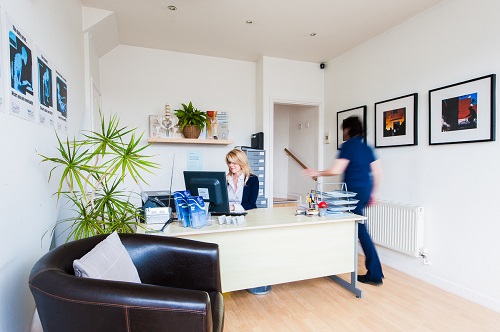
Injuries sustained with sport are often specific to that particular type of exercise. All our physiotherapists have an interest in sport and have extensive experience treating sports injuries.
We are able to give advice re getting started with sport and training progressions. It is often helpful to liaise with coaches/ personal trainers to maximise recovery and improvement.
We have excellent links with all the orthopaedic and Rheumatology consultants in the Swindon area. After an assessment, if we feel you require a further opinion/ investigation, we will contact your GP or Consultant with the detailed information they require and liaise re further treatment.
We are able to refer for a private Xray or MRI scan where clinically necessary and happy to discuss the indications for further investigations with you.
Preferred providers for BUPA, AXA PPP, Cigna, WPA, Aviva etc.
To find out more or to arrange an appointment, call our receptionist Sally on 01793 845234 or email info@mkvphysio.co.uk